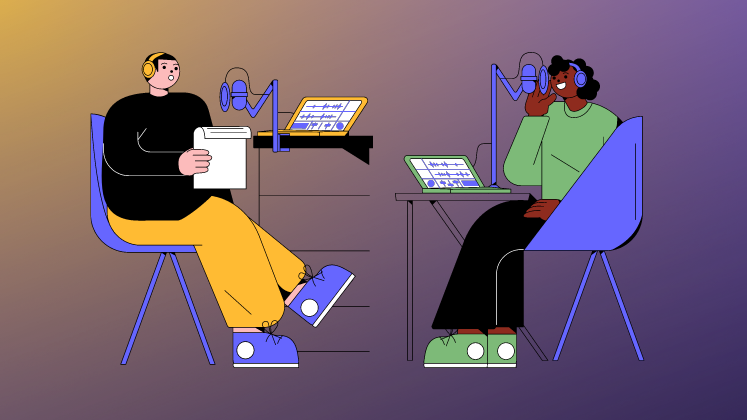Discussing the launch of his new podcast series ‘Get Happier’, Paul Dolan argues for the underrated power of checklists and mnemonics and shows how they can be applied through the medium of podcasting.
I’ve just launched a new podcast mini-series called Get Happier. Unsurprisingly, it’s about how we can use the science behind happiness to improve our own lives and those that we care about or are responsible for. So, you might expect this blog post to say something about how easy it is to get happier. I want to do something a bit different, however, and more in line with the aims of the Impact Blog. I’ll talk instead about why it’s called get happier and how the content follows from that title.
Get happier contains ten letters. There are ten episodes of the podcast (and each is no longer than ten minutes). Each episode starts with a letter of get happier:
Go Get started by breaking bad habits and creating good ones.
Evidence What the science says about the factors affecting happiness.
Tales Be alert to powerful narratives about what ought to make you happy.
Hurdles Understand the biases that can prevent you from being happier.
Attention You are what you attend to and so pay attention to what matters.
Pleasure & purpose The two key components of what it means to be happy.
Population We affect, and are affected by, those around us.
Interventions Some examples of changes that can bring long-term happiness.
Employment The role of work and the workplace in determining happiness.
Reflection Reflect on the science behind happiness as it applies to you.
This podcast is therefore in the form of a mnemonic. It is a pattern of letters in the form of a short phrase (and one that is beautifully suited to the subject matter) that makes remembering the title of each episode much easier. My favourite mnemonic at school was Richard of York Gave Battle in Vain for the colours of the spectrum (red, orange, yellow, green, blue, indigo, violet). It was relevant to me because our form groups were the colours of the rainbow (I was in indigo: clearly the best colour).

Insofar as get happier covers the main issues in the science behind happiness, then it can be used as a checklist for improving happiness. Checklists allow us to step back from an issue to take a more complete look at it. They have a track record in job interview contexts, which are typically fraught with bias. In short, getting interview panels to rank interviewees against pre-specified criteria has been shown to reduce biases in hiring. If we are forced to evaluate our judgements in terms of pre-determined criteria, rather than just in terms of criteria we cherry pick in the moment, we are more likely to reach a balanced conclusion about which course of action to take.
Checklists also help to draw us back from situational blindness.
Checklists also help to draw us back from situational blindness. This is most frequently discussed in the aviation and medical sectors, where checklists are used to circumvent errors made by pilots and surgeons when they miss crucial information in their environment. Pilots and doctors rely on routine checklists to improve their situational awareness. The checklists contain some quite simple information, but serve to ensure that there is a full picture of all the factors that affect safety.
A checklist will only be effective if it contains elements that are important to producing better outcomes. Pilots check whether they have a co-pilot sitting next to them because fewer planes crash with co-pilots than without. The airline industry is notoriously forensic in the way in which it investigates a crash, and lessons really are learned about how to reduce the risks of future incidents. No other sector is quite like aviation, not even medicine, but having to make a case for why an item should be on a checklist will at least ensure that evidence, of the lack of it, is discussed.
I have been involved in creating similar checklists for behavioural science interventions for over a decade now. One that continues to influence my thinking, is MINDSPACE, which sought to capture nine of the most robust influences on behaviour that operate in largely unconscious ways (i.e., without appealing to people to change the way they think about anything). I’m currently working on a checklist for reducing affective polarisation in society that is called EMBRACE. It should be pretty clear by now that I’m a big fan of mnemonics and checklists.
Or perhaps we have a strange relationship with ease, feeling better in some perverse, and again largely unconscious, way when we make things difficult for ourselves.
So why aren’t there more of them in academic research and practice? I wonder whether it’s because academics might view them as a bit gimmicky and childish. This might be a largely unconscious reaction that they are not entirely aware of (notwithstanding that some academics consider most things in life to be gimmicky and childish). But who can really remember which way east and west point without rehearsing “nobody eats shredded wheat” or “naughty elephants squirt water” in their heads?
Or perhaps we have a strange relationship with ease, feeling better in some perverse, and again largely unconscious, way when we make things difficult for ourselves. One of the main themes of my research, which also runs through get happier, is that we need to get over ourselves about various aspects of the human conditions, such as our inherent laziness. If checklists make life easier, then let’s make more use of them, not only to get happier but to increase the impact of academic research.
You can listen to Get Happier on your preferred podcast platform and read more of Paul’s writing on his substack, Crystal.
The content generated on this blog is for information purposes only. This Article gives the views and opinions of the authors and does not reflect the views and opinions of the Impact of Social Science blog (the blog), nor of the London School of Economics and Political Science. Please review our comments policy if you have any concerns on posting a comment below.
Image Credit: Yingchou Han via Unsplash.







